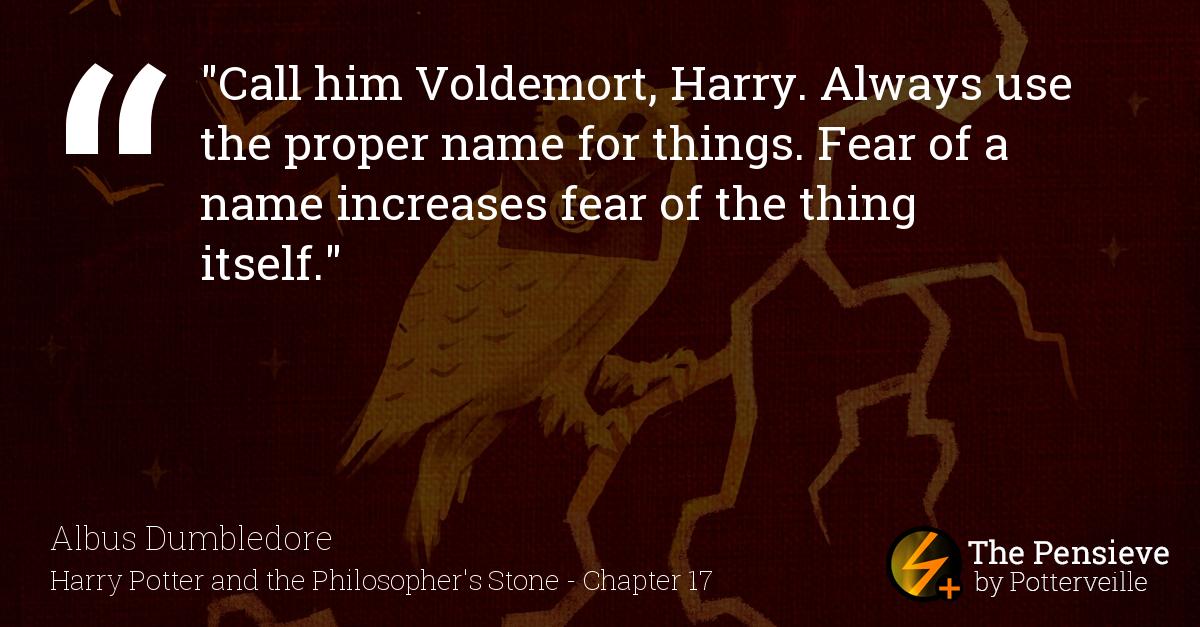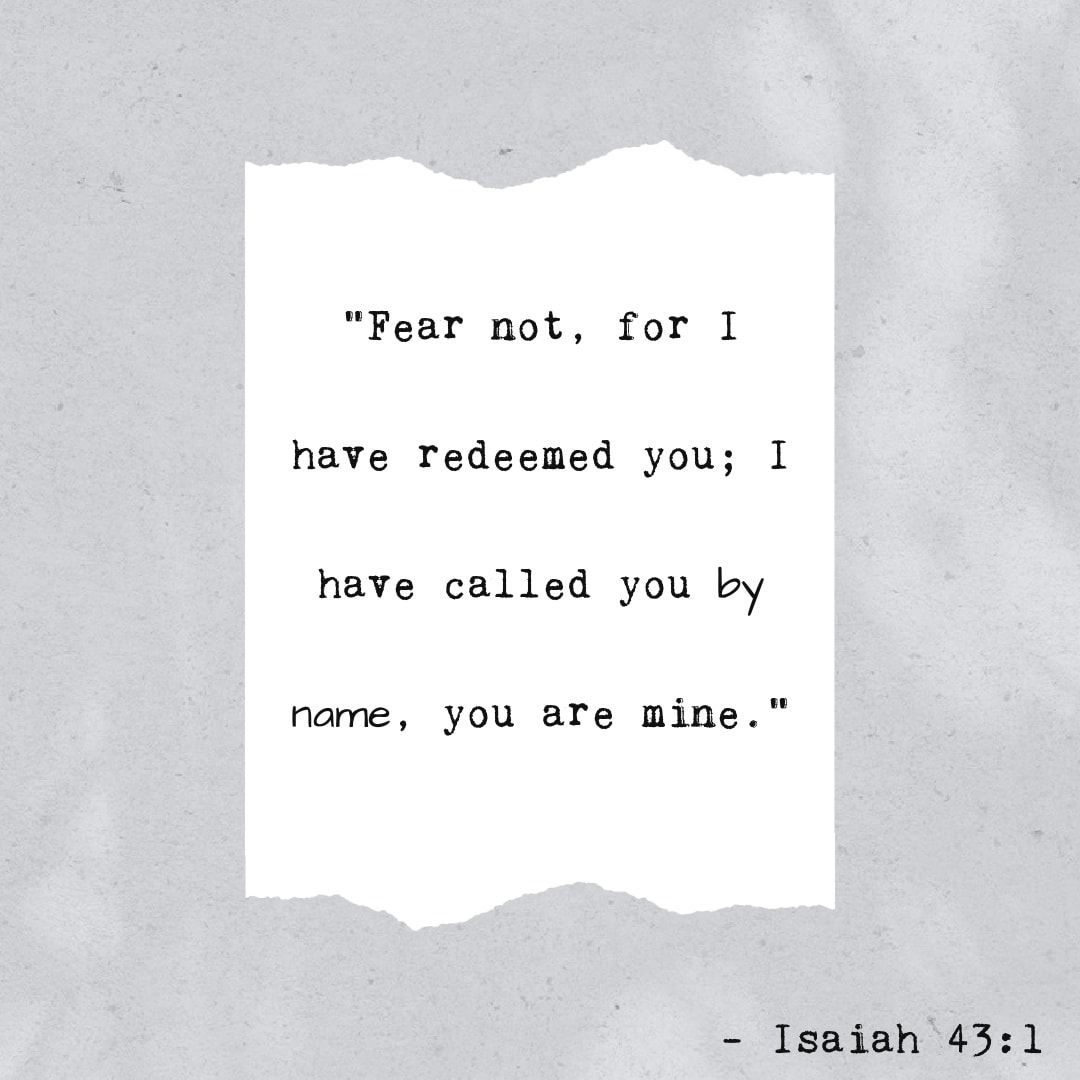We were having one of our (now frequent) conversations about the Harry Potter universe when I noticed that Charleston exclusively referred to the book’s antagonist as “You Know Who.” At first I assumed this was because he had forgotten Voldemort’s name, but as our chat continued I realized that his replacement was intentional. Like many characters within the books, Charleston’s fear of Voldemort had led him to avoid uttering the villain’s name.
Not for the first time, I found myself quoting Albus Dumbledore: “Call him Voldemort, Charleston. Always use the proper name for things. Fear of a name increases fear of the thing itself.”

What a gem of advice from this wise wizard! Dumbledore is right: when we refuse to use proper names, we allow that unnamed person or object to remain in darkness, hidden beneath layers of uncertainty. There, under a shroud of anonymity, a sense of distrust and confusion can fester. Ambiguity becomes fuel for fires of negativity, empowering evil forces that thrive in secrecy.
But when we give names to things—even frightening things—we draw them into the light. Their grotesqueness is exposed, and we are given a complete picture of what we are up against. Only named and known enemies can be conquered.
Rarely is a failure-to-name done with sinister intent. Often, ideas and objects remain unnamed for completely innocuous reasons—laziness, perhaps, or a lack of creativity, or a frustration over an inability to choose the exact right name that leads us to avoid naming altogether. Unfortunately, even unintentional not-naming has its consequences.

I tend to think of this idea of “naming things” as it relates to big concepts: ideologies, or political movements, or values. But naming can be just as important in the little things in life, as I am quickly learning from the little people in my life. In fact, it was a recent scenario with the twins that first set the wheels of this idea into motion. It began with the church. . .
Our family attends two churches. Our primary church, Northpoint, is where we worship on Sunday mornings, where we participate in a number of small groups, and where we volunteer mid-week. But we also attend a women’s Bible study at another (larger) church, Hill Country. For a long time I worried that using the names Northpoint and Hill Country might confuse my kids, so I went out of my way to use other descriptors: Sunday Morning Church, or Bible Study Church, or The-Church-That’s-Closer-To-Our-House-That-We-Go-To-All-The-Time, or The-Really-Big-Church-That-We-Go-To-On-Thursday-Mornings-And-Very-Occassionally-On-Sundays. Clearly my descriptors got a little out of hand, and still the kids never knew which church I was referring to when I told them we needed to load up in the car and head to church. Then, one clear-headed Sunday morning, I had the brilliant idea of explaining to the kids as we pulled into “church” that this was Northpoint Church. And then, that Thursday, as we drove into Bible Study I told them that this was Hill Country Church. That was that. They latched onto the appropriate names right away. Confusion was vanquished; clarity reigned.
In my attempts to impart accurate information to my children, I had failed to provide them with what would have been most accurate of all: a name. I underestimated their need for an accurate identifier while overestimating their ability to grasp my vague references to unnamed places. My naming failure had completely benign origins but led to extended confusion. The ridiculously simple solution of attaching a name to a place cleared it all up in one fell swoop.

Since our family’s church name debacle, I have become more intentional about using proper names for all of our usual places and activities. We don’t just go to “help out at church on Wednesday;” we attend Wow Team. We don’t practice reading and writing and spelling; we have a Language Arts block. Charleston doesn’t attend the catch-all place of school, but Rock Enrichment Academy on Tuesdays and Saints of Texas on Thursdays. The names may seem unwieldy and sound humorous coming from my toddlers’ mouths, but a challenging-to-pronounce name is far easier for them to conceptualize than no name at all.
Sometimes we might use silly names that are unique for our family: miniature Triscuit crackers that we keep in a jar are “cardboard”; prepackaged shredded Colby Jack is “messy cheese”; canned mandarins are “squishy oranges.” This may seem like a foreign language to non-family members, but within our family we are using a moniker WE all understand. The name is unconventional, but the practice of naming holds.
Having had such success in naming things/places/ideas for my kids, I am starting to wonder where a lack of naming has led to darkness and powerlessness in other realms. Are there bad habits I’ve left unaddressed because I haven’t given them a name? Are there ideas I am afraid to ponder because namelessness has kept me from knowing where to start? What lessons has God begun to teach me that can only unfold once I’ve named the lesson itself?
God is no stranger to the power of naming. In the Creation story recorded in Genesis, He gives names to each thing He creates before ever calling those things good. Night and day, sky and seas, land and stars and plants—all were deemed worthy of a name. Then God passed on the mantle of Name-Bestower to the very first man: “He brought [all the wild animals and all the birds in the sky] to the man to see what he would name them; and whatever the man called each living creature, that was its name.” (Genesis 2: 19)

To this day, humankind holds the power to name things. You could even call it our SUPERpower, because through naming we bestow dignity, value, and clarity. The reverse is also true: when we forgo our naming superpower, we forfeit understanding and agency to The Un-Named as it becomes Un-Understood, Un-Known, and entirely Un-Defeatable.
Charleston now refers to Voldemort without trepidation. My kids and I now have shared language for our church experiences. We must also now move on to calling out other things for all that they are: bad things are evil, good things are beautiful, God’s Word is Truth, deceptions are unequivocally lies. We pray for discernment in choosing names that are right and accurate, but we are heeding Dumbledore’s advice of using Proper Names for things. There’s just not enough room for extra fear and confusion in our lives.